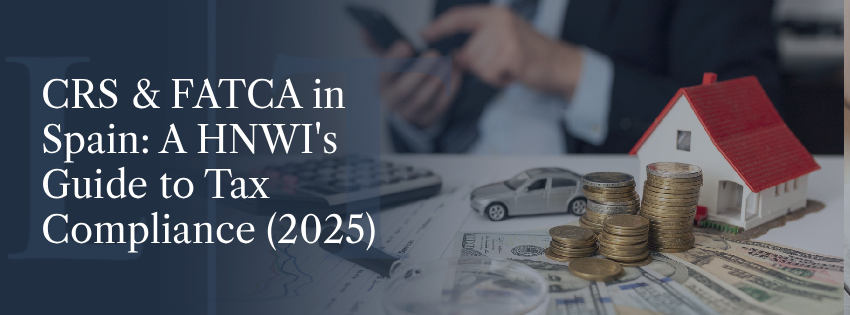For High-Net-Worth Individuals (HNWIs) with interests in Spain, the era of banking secrecy is definitively over. As a committed member of the OECD, Spain strictly enforces the Common Reporting Standard (CRS) and the U.S. Foreign Account Tax Compliance Act (FATCA). These are not just regulations; they are powerful frameworks mandating the automatic exchange of financial information on a global scale.
Understanding these rules is no longer optional—it is the cornerstone of protecting your assets and ensuring your financial affairs remain secure and compliant.
This guide, prepared by the legal and tax experts at Lextax, breaks down exactly what CRS and FATCA mean for you, your key obligations as a potential Spanish tax resident, and how to navigate this new landscape with confidence.
Is your international asset structure fully compliant with Spanish law? Misunderstanding tax residency rules can lead to significant penalties. Our integrated team provides the expert analysis needed to protect your wealth.
Schedule a Confidential Consultation
How CRS & FATCA Ended Banking Secrecy in Spain
These two agreements are the mechanisms that compel Spanish banks to report the accounts of foreign clients to tax authorities.
- Common Reporting Standard (CRS): An OECD-driven global system where over 100 countries automatically exchange the financial data of non-residents. Spanish banks identify your tax residency and report your account details to the Spanish Tax Agency (Agencia Tributaria), which then shares them with your home country’s tax authority.
- Foreign Account Tax Compliance Act (FATCA): A specific agreement between Spain and the U.S. It requires Spanish financial institutions to identify any «U.S. Person» (citizen, Green Card holder) and report their accounts directly to the U.S. Internal Revenue Service (IRS).

Key Tax Obligations for HNWIs in Spain
Holding assets or spending significant time in Spain triggers unavoidable responsibilities. The most critical step is determining your tax residency status.
The Risk of Becoming a Spanish Tax Resident
- You are considered a Spanish tax resident—and therefore liable for tax on your worldwide income and assets—if you meet just one of these criteria:
- You spend more than 183 days per year in Spain.
- Your primary center of economic or professional interests is located in Spain.
- Your spouse and/or minor children reside in Spain (and you are not legally separated).
Essential Tax Declarations You Must Know
If you are a Spanish tax resident, you must be aware of these key forms:
-
- Modelo 720: A mandatory declaration of foreign assets (bank accounts, securities, real estate) if their total value exceeds €50,000.
- Wealth Tax (Impuesto sobre el Patrimonio): An annual declaration on your net worldwide assets, typically triggered if your net worth exceeds €700,000 (thresholds vary by region).
- Solidarity Tax on Great Fortunes: An additional state-level tax on high net worth, generally for those with net assets over €3 million.
- FATCA Reporting (For U.S. Persons): U.S. citizens and Green Card holders have specific reporting obligations for their foreign assets to the IRS.
Failure to comply can lead to severe fines, automated audits, and significant financial risk.
Your 5-Step Asset Protection Strategy with Lextax
Navigating this complex environment requires a proactive and integrated strategy. Our process is designed to provide complete security and peace of mind:
- Tax Residency Diagnosis: We start with a deep analysis of your situation to precisely define your tax residency status and obligations.
- CRS & FATCA Certification Review: We work with you to ensure your self-certifications with financial institutions are accurate and up-to-date.
- End-to-End Declaration Management: We meticulously prepare and file all necessary tax forms (Modelo 720, Wealth Tax, etc.), preventing costly errors and omissions.
- Preventative Tax Audit: We identify and correct potential discrepancies in your financial reporting before the tax agency has a chance to.
- Strategic Wealth Structuring: We design compliant legal structures to protect your assets and assist with voluntary disclosures if needed to regularize your situation.
Frequently Asked Questions for HNWIs
What happens if I was unaware I had become a Spanish tax resident?
This is a common scenario. At Lextax, we conduct a tax residency analysis to clarify your obligations and, if necessary, explore voluntary disclosure options to regularize your situation and mitigate penalties.
Do I need to declare assets held in a foreign trust?
Yes. As a beneficiary or settlor of a foreign trust, you are typically required to declare its assets on Modelo 720. This is a complex area where our integrated legal and tax advice is crucial.
What is the deadline for filing Modelo 720?
Modelo 720 must be filed by March 31st each year, reporting on the assets you held as of December 31st of the previous year.
I am a U.S. citizen living in Spain. Do I have to file in both countries?
Yes. We are experts in managing the dual-filing obligations for U.S. citizens, ensuring full compliance with both FATCA and Spanish law while leveraging double taxation treaties to your benefit.
From Compliance to Complete Peace of Mind
In today’s transparent world, compliance is not a burden to be feared; it is the outcome of expert planning.
At Lextax, we go beyond tax forms. We provide holistic solutions by integrating our legal, tax, and wealth management services under one roof. Our mission is to handle the complexities so you can enjoy your life and investments in Spain, worry-free.


